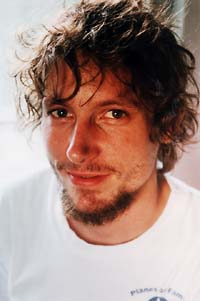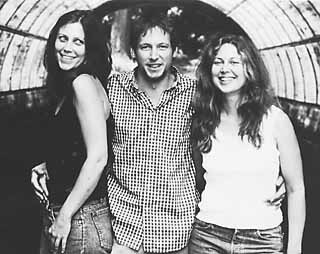The Natural
By Christopher Hess, Fri., July 30, 1999
|
|
"I got the blond one so I could have the D. Boon model," he laughs, referring to the light-grained Fender Telecaster he's been caressing faithfully in both local bands since he bought it in 1989. The D. Boon he mentions is the same model guitar that the Minutemen's lead singer used to play in his seminal Southern California punk rock trio prior to his death in a car accident in 1985. The Minutemen are only one of many sources of inspiration Bernard cites, a long, eclectic list that includes Keith Richards, Eddie Van Halen, and even jazz great Thelonius Monk. Perhaps this is why some locals look to Bernard's blond as the real attraction behind the Damnations TX.
"I used to play a Kramer with a Floyd Rose [tremolo unit] on it, which was a total piece of garbage," says the guitarist with his characteristically wolfish grin. "It was the Eddie influence on me, obviously."
Born in Shreveport, Louisiana, in 1966, Bernard got his first guitar, a black Peavey T-60 with a small Peavey practice amp, as both a gift for graduating from the eighth grade and as a means to keep the rambunctious youth from assaulting his mother's expensive classical guitar. His first love was no blond.
"Keith Richards was my biggest influence early on," says Bernard. "I played along with what I liked at the time, which was a lot of Beatles and Stones. I learned how to do the chords with this old book; it was cool because listening to music and playing along with it, it's happening right then, so you have to improvise or the song's gonna be over. I learned playing over my records."
Like any music-hungry kid should, Bernard had someone feeding his need -- that revered elder male whose advice carries great weight with a young and impressionable mind.
"My cousin, who was like five or six years older than me, lived in Baton Rouge, and he had this awesome record collection. His room was really cool, too; when we went stay with him I always wanted to stay in that room, because he had the cool stereo and all these beer cans he collected all over the walls and shit. Huge beer can collection. He had all kinds of shit. I heard the Sex Pistols when I was 11 years old. He had everything the Beatles ever did, everything the Stones ever did. I plowed through that and moved out from there. He was the first musical guru I ever had."
If the archetypal sound of Keith Richards' blues-fueled style was the basis for Bernard's developing vocabulary, then it was Eddie Van Halen who took the budding guitarist's playing to another level. As many who have witnessed Prescott Curlywolf shows can attest, Bernard does a note-for-note cover of Van Halen's "Hot for Teacher."
"My parents had this old Magnavox stereo with 16[rpm] speed on it," he explains, "and I figured out that if you put it on the 16 setting, it was almost exactly an octave below where it was at 33[rpm]. It was a little off, but you just re-tune it down a little. So I'd listen to Halen solos turned down to 16 speed and learn them that way. To this day, I can play pretty much 90% of everything they ever did just from memory. "
Besides a one-off gig for a high school talent show -- which his band won with three Van Halen tunes -- Bernard's first real band was a group of friends who performed mostly Red Hot Chili Peppers covers with some Kinks and Ramones thrown in at a Shreveport bar called The Killer Poodle, which was owned by the brother of a friend. The club was the only place in the city that was hosting live music at the time, especially the kind that interested a growing alternative rock audience. Bernard's band, Iraz Baz, had a regular Monday night slot, and the Picket Line Coyotes, led by Kevin Russell, played every Tuesday night. By hanging out at The Killer Poodle, the guitarist got to know PLC's singer, now the guiding force behind Austin institution the Gourds, which counts Bernard's accordion-playing brother Claude among its members.
"I never really started to write songs until I joined the Coyotes," says Bernard. "I was content to just play the stuff I loved, but Kevin totally changed that. He was a huge musical influence on me as far as exposing me to shit I wouldn't have otherwise given the time of day."
Soon, Bernard discovered that all country music didn't suck, and that some of it -- Dock Boggs, Merle Haggard, and Hank Williams -- was as vital and rough-edged as rock & roll. Though it would play a larger part later in his development as a performing artist, at the time -- age 18 -- Bernard was still preoccupied with "rocking out" to let too many tears fall in his beer.
The Picket Line Coyotes got better, becoming the big fish in the Shreveport scene they helped create, so they set their sights on bigger ponds. Moving to Dallas in 1987 to take advantage of the burgeoning Deep Ellum scene, PLC found most clubs and audiences far too preoccupied with the white-boy-funk sounds developing all over town in bands like Hash Palace to notice what this punk band from Shreveport was up to. After a couple years of trying to make a dent, another move was imminent.
"We started doing little tours," he says. "We'd come down to Austin and play somewhere, usually at the Cannibal Club. I remember we played there with Ed Hall one night, like the first time we came to Austin. There were maybe four people there, and we sucked. Really bad. We were all just sitting at the bar like, 'We sucked and nobody's here,' then Ed Hall got up on stage and just blew us away. We were pretty much the only people there, but we really got into that shit. We realized how cool Austin was, so we moved here in 1990, I think."
The Coyotes, having added Jimmy Smith (also presently of the Gourds) to their lineup before leaving Dallas, came to Austin and continued to play rock shows for a couple of years. Things were changing in the band, though, and like a constellation of young rock bands before them, musical differences led to their demise.
|
|
"I was starting to write more and more what you'd call 'rock [songs]' and Kevin didn't want to do them," recalls Bernard. "He was by far the better songwriter, and at the time, his stuff was getting quiet. When I joined, the Coyotes were this raging unit -- this all-out attack. As Kevin started maturing and quieting down, the band's approach moved a lot more to the lyrical side of things. I was just into totally rocking out. That caused some friction. I would be too loud, play too loud, and eventually I was like, 'I wanna start my own band.' I had no idea what I was gonna do, but we broke up."
Spending the better part of a year channeling his enthusiasm into Fuzz, a loud rock band that included PLC drummer Dave Green, Bernard then became re-acquainted with a couple of guys he'd met at Baylor University, where the Coyotes would often play parties for The Nose Brotherhood, a "secret society" of intellectual partiers. Tim Kinard and Ron Byrd had both moved to Austin, and it wasn't long before the trio found drummer Keith Langford and formed Prescott Curlywolf. On the group's first gig, at the Austin Outhouse, Jeff Cole of then-fledgling record label Doolittle Records saw the band and tried to sign them then and there.
"Our first gig!" exclaims Bernard. "We were like, 'What the hell?' You know? I thought we had to work harder than this. It was pretty funny. We said sure, what the fuck, let's sign this and make a record. We thought it was great that anybody would give a shit, especially our first fucking show. So we signed to Doolittle."
Unfortunately, "what the fuck" runs at a high hourly rate in most local studios, and Prescott Curlywolf quickly found themselves in the hole on their debut, Dang. The tale of Prescott's being drafted (along with Hamell on Trial) to Mercury Records and subsequently abandoned and dropped, plus the story of the major label spending a grand total of $600 on promoting the band's second album Six Ways to Sunday, have become the stuff of local watch-out-or-this-could-happen-to-you legend. A legend with a happy ending it turns out; Mercury not only bought Prescott out of their deal, they eventually escaped scot-free with the rights to Six Ways to Sunday.
Rather than break up, the band plodded onward, playing to local crowds, using the now-defunct Electric Lounge as a home base (as did the Damnations early on). Eventually, in 1998, they put out their best album to date on local indie Freedom Records, Funanimalworld. Easily the strongest of the band's three releases, the album's live-to-two-track production captures the band's energy. It's the result of a band that has not only fulfilled much of its potential as far as a body of songs is concerned, but a band that has also realized its own limitations.
"It became obvious to us pretty quick that we couldn't tour, because everyone in the band had careers. We pretty much put that part of it behind. We were still gonna be a band, play locally and occasionally out of town and do records and all that, but we weren't gonna pursue a career that way any more. Ron's a doctor, and now Chris writes code, a computer programmer. Tim is going for his master's in anthropology, so he's really busy. I was the only one with time, basically."
It was around the time of this realization, 1996, that Bernard started filling that free time with a casual side-project: the Damnations. Hardly a part-time affair for sisters Deborah Kelly and Amy Boone, the Damnations lucked into the guitarist's services through the urging of former P-Wolf drummer Keith Langford, who was then dividing his time between them and the Gourds. As is often the case with similarly incidental aggregations, it didn't take long for the "side project" to become his main focus, Bernard playing guitar and banjo on both the Damnations' debut, an indie CD pressing of the band's KUT LiveSet, and Half Mad Moon, the group's major label debut for Sire earlier this year. In fact, it was the opportunity to play the banjo that helped lure Bernard into the band in the first place.
"To me it's the same thing [as guitar] -- with one less string and a different tuning," explains Bernard. "I'm much more into the primitive kind of gutbucket banjo sound rather than the filigreed classic bluegrass sound. Like the banjo on [Tom Waits'] Rain Dogs: more a percussive instrument than a lead instrument. It's sort of like a drum with strings on it -- it should be more of a percussive instrument than a lead."
Not that the banjo is replacing the guitar. Not by a long shot. The guitar is where Bernard lives and breathes. The 32-year-old musician handles his instrument the way Sammy Sosa swings a bat -- with an utter and complete ease of motion that belies the power behind the movement. Facing Bernard from the audience as he fronts a set by Prescott Curlywolf, slightly hunched over, feet planted wide, grinding out a string of riffs and lunging hard on the beat, you'd think he would be out of place anywhere but center stage, the focal point of the room's attention. That is, until you see him standing stage left at a Damnations TX show, working a banjo into the same willing submission as his blond Tele, the room's attention draped on the sisters' golden harmonies and charisma.
"They're definitely the more photogenic members of the band," laughs Bernard, who along with the interviewer is on his fourth pint. Explaining that such consumption is status quo for Prescott Curlywolf ("We start off strong, but we're usually drinking the whole time, so we start fucking around and having fun and it goes downhill from there"), Bernard is just as enthusiastic about the Damnations, who look to be fulfilling his and every other struggling musician's wildest dreams: making a living from playing music they love.
"I think Deborah is a natural frontperson. And it's cool, they have awesome harmonies, you can't deny that. That's what attracted me to the band in the first place. They write really well and they have great harmonies. They're naturals. I kind of feel like I'm a natural too. I like being in a band of naturals.
"I've been asked a lot about the attention they get and all that, but it doesn't bother me in the slightest. We wanna be known as a band. I don't want to be a sideman. I don't feel like a sideman, but it doesn't hurt my ego to the point where I'm like,'Goddamnit, where's the picture of me?!' Fuck that, you know? It's more important than that."
Besides the Damnations TX and Prescott Curlywolf, Bernard is periodically involved with a couple other local bands as well. El Dopa features Bernard, Kinard, Langford's replacement on the P-Wolf drum kit Chris Deaner, and Victor Hernandez switching off instruments, while the Diaz Brothers uses the same Prescott backbone to support the songs of Phillip McEachern, who "can conjure up the kid memories like no one else I know," according to Bernard. Another natural it seems.
"All I ever wanted to do is be in a band," says Bernard emphatically. "Make my living at that and touring and all of it. Prescott couldn't do it, and that's a shame, because I'd be right there. I still am there, but ... We never really thought the Damnations would tour, it kind of just happened. It was just playing with friends, and all of a sudden we started getting really good press, and we had the opportunity to tour. it was like, 'Hell yeah, let's tour.' It's all I ever wanted to do -- all any of us ever wanted to do. So we're touring. And it feels good, living the life.
"There are moments when you feel like jumping out of the van -- as it's moving," he laughs. "But it's great, we've had some really great times on the road. We all complement each other really well. We have mutual tastes in music; we're into a lot of the same stuff. It's just a total grab bag of influences acting on us."
The Damnations TX are getting a couple more short tours in before they head back into the studio to record their next album, probably this fall. Meanwhile, Prescott Curlywolf is doing the same thing. The grab bag of influences gets bigger all the time, and it all finds a way into Bernard's guitar playing.
"You gotta balance your rhythm and your chaos," Bernard says. "A good song is like a mobile, hanging from the ceiling; you got stuff hanging here and stuff hanging way over here, but it's all in equilibrium. You just have to balance out all your influences and be true to them because -- like it or not -- they affected you, so they must be valid."










